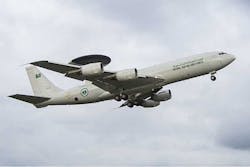Boeing to upgrade computers, IFF, navigation, and communications aboard Saudi AWACS planes
Officials of the U.S. Air Force Life Cycle Management Center at Hanscom Air Force Base, Mass., are asking the Boeing Defense, Space & Security segment in Oklahoma City to perform the avionics upgrade aboard the Royal Saudi Air Force AWACS fleet. The contract involves the Foreign Military Sales (FMS) program.
The upgrade, which involves the Saudi AWACS program phase 1, will upgrade the Saudi AWACS mission computers, navigation and communications systems, and install a next-generation identification friend or foe (IFF) system.
The upgrade will replace the Saudi AWACS legacy mission computer system with an open-systems network-based computer architecture. The upgrade also will replace the Saudi AWACS operator terminals with a network of commercial off-the-shelf (COTS) operator workstations linked to several COTS computers.
Related: Air Force considers major electronic upgrades to AWACS aircraft computers and sensors
A Gigabit Ethernet local-area network that adds digital communications for control of the radios, and for internal communications, will connect these computers. The computer upgrade will include new mission computing hardware and software with open-architecture computers, servers, and mission interactive displays.
This upgrade also will install the AN/UPX-40 IFF system from Telephonics Corp. in Farmingdale, N.Y. This system will enable the Saudi AWACS to identify and position aircraft or ships as friendly or unknown, as well as determine their bearing and range. The new IFF system will include receivers, interrogators and processor hardware for earlier detection of friendly contacts.
On this contract Boeing will do the work in Oklahoma City, and should be finished by February 2019. For more information contact Boeing Defense, Space & Security online at www.boeing.com/defense, or the air Force Life Cycle Management Center at www.wpafb.af.mil/aflcmc.
Ready to make a purchase? Search the Military & Aerospace Electronics Buyer's Guide for companies, new products, press releases, and videos
